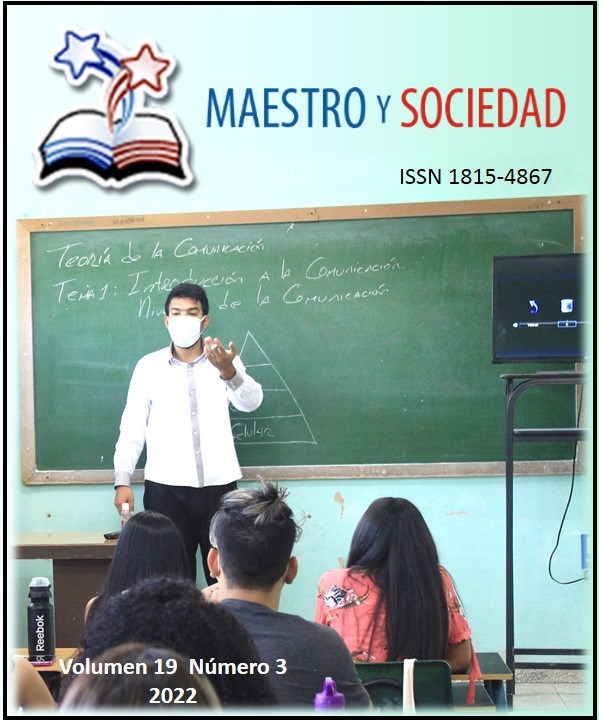Learning potentialities and limitations in the agri-food project “From the Family”
Learning potentialities and limitations in the agri-food project “From the Family”
Keywords:
limitations, potentialities, agrifood project, family, production, economy and socioculturalAbstract
Food production is an essential axis for the development of third world countries, especially today when the Covid-19 pandemic has left a global crisis. The territories must initiate education in the always, attention, harvest and commercialization or exchange of products obtained in the different spaces of the families. The objective of this article is to systematize the learning potentialities and limitations presented by the agroecological project "From the Family" in its real praxis during the 3 years of being established in the municipality of Santiago de Cuba. The methodology used is qualitative and its method is systematization with the use of interview and observation techniques for data collection. The main results show the possibility of new forms of production in the spaces that the project has and the delivery alternatives of its productions, limitations and potentialities that it has.
References
CEPAL (2017). Agenda 2030 y los Objetivos de Desarrollo Sostenible. Naciones Unidas http://www.un.org/sustainabledevelopment/es
Clavijo, P. C. & Cuvi, N. (2017). La Sustentabilidad de huertas urbanas y periurbanas con base agroecológica en Quito. Letras Verdes. Revista Latinoamericana de Estudios Socioambientales, 21, 68-91.
Consejo de Estado. (2011). Decreto Ley 300. http://www.micons.gob.cu/sites/default/files/MICONS/Marco%20Normativo/DECRETO-LEY%20No.300.pdf
Estévez-Pichs, M A., Acevedo Pastrana, B., & Margot Suárez, L. (2017). La construcción de poder hacia una educación ambiental participativa. Universidad y Sociedad, 9(2), 60-66.
Feble-González, J. M. (2016). Análisis y diagnóstico de políticas agroambientales en Cuba. Fortalecimiento de las políticas agroambientales en los países de América Latina y el Caribe. Proyecto GCP/RLA/195/BRA. http://www.fao.org/3/a-i5559s.pdf
Jara, O. (2015). La sistematización de experiencias produce un conocimiento crítico, dialógico y transformador. Docencia, 53, 33-39.
López-Paredes, C.R., Chávez-Cadena, M. I & Herrera-Morales, G.C. (2022). Los Huertos Urbanos un Emprendimiento para garantizar la Soberanía Alimentaria. FIPCAEC, 7(1), 246-274. https://doi.org/10.23857/fipcaec.v7i1.520
Medina, F. (2016). Cuba: agricultura sostenible y soberanía alimentaria. http://www.cubahora.cu
Méndez, M., Ramírez, L. & Alzate, A. (2005). La práctica de la agricultura urbana como expresión de emergencia de nuevas ruralidades: reflexiones en torno a la evidencia empírica. Cuadernos de Desarrollo Rural, 55, 51-70.
Naciones Unidas. (2015). Proyecto de documento final de la cumbre de las Naciones Unidas para la aprobación de la agenda para el desarrollo sostenible 2030. http://www.un.org/es/comun/docs/?symbol=A/69/L.85
Nogales, M.T., Paredes, R & Rivera, M. (2018). Experiencias de agricultura urbana y periurbana en el ALTO y La PAZ. Fundación Alternativas, HIVOS: La Paz.
Padilla-Carrillo, J. M. (2020). Estrategias agroecológicas urbanas para mitigar la disrupción de los sistemas agroalimentarios convencionales en el barrio Nueva Esperanza, Cantón Ambato, Provincia de Tungurahua en el periodo 2019-2020 [Bachelor's thesis, Ecuador, Latacunga: Universidad Técnica de Cotopaxi UTC].
Santana González, Y., Torres Rodríguez, O., Rodríguez Martínez, Y., Silva Albear, Y., & Oris Martínez, L. (2022). Acciones de atención psicológica durante la covid-19 a través del chat “Santiago se Levanta”. Revista Conhecimento Online, 1, 189–212.
Santana, G.Y.; Sagaró, Del C.N.M. & Valdés, G.L.E. (2021). Percepción de riesgo vs Covid-19 en centros hospitalarios de Santiago de Cuba. Revista Universidad y Sociedad, 13(4), 195-206.
Published
How to Cite
Issue
Section
License
Copyright (c) 2022 Yorkys Santana-González, Wilde Sánchez-Bell, Raico Mena-Sánchez, Adelaida Durand-Frometa

This work is licensed under a Creative Commons Attribution-NonCommercial-NoDerivatives 4.0 International License.
This journal provides immediate open access to its content, based on the principle that offering the public free access to research helps a greater global exchange of knowledge. Each author is responsible for the content of each of their articles.



























 Universidad de Oriente
Universidad de Oriente 